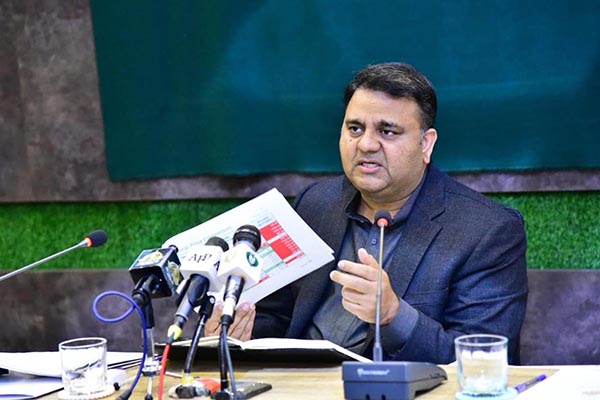
Information Minister Chaudhry Fawad Hussain address post-cabinet meeting press conference. Photo courtesy PID
In briefing, information minister says cabinet has ‘rejected’ COVID-19 funds audit and blames Sindh government for rampant nationwide inflation
The Pakistan Tehreek-e-Insaf (PTI)-led government will not release funds to the Election Commission of Pakistan (ECP) if it does not utilize electronic voting machines (EVMs) for future elections, Information Minister Chaudhry Fawad Hussain said on Tuesday.
“The ECP is bound to conduct all elections using EVMs as Parliament has passed it into law,” he told a press conference after the weekly meeting of the federal cabinet. “If the elections are not held through EVMs, then the government would not be able to release funds to the ECP,” he said, claiming that Law Minister Farogh Nasim had backed this view. “The law permits holding elections only using the EVMs,” he said, adding that the cabinet had formed a committee and directed the law ministry to give its legal opinion on the issue.
Last month, the incumbent government amended the Elections Act 2017 through a joint session of Parliament, granting overseas Pakistanis the right to vote from their place of residence and directing the ECP to utilize EVMs for polling. The move has drawn controversy, with opposition parties declaring the move a plan for electoral rigging, and independent experts warning that in the absence of consensus, the use of EVMs could see mass rejection of any results.
“That is why we want the ECP to quickly move ahead in this direction,” said Fawad, adding that Science and Technology Minister Shibli Faraz had briefed the cabinet about the number of EVMs the government believed was required; training of staff; responsibilities of agencies concerned; public awareness campaign and timely delivery.
According to local media, the cabinet believes 400,000 EVMs would be sufficient for the 2023 general elections. However, the ECP has already said that it would need a minimum of 800,000 EVMs.
On being asked whether the government was “blackmailing” the ECP by linking funds for it to the conduct of elections via EVMs, Fawad claimed that was akin to labeling Parliament a “blackmailer.” He said that Parliament had passed the legislation and the ECP was now bound to implement it.
The information minister said the cabinet had also expressed reservations over videos that appear to show bribes for votes in an upcoming by-poll in Lahore. “Such illegal activities would not have come to the fore if steps had been taken by the ECP against horse trading in the recent Senate election,” he claimed and urged the ECP to ensure the matter was resolved.
COVID audit
According to Fawad, the cabinet had “rejected” the audit of the government’s COVID-19 expenditure, which had found over Rs. 40 billion of irregularities. “The cabinet rejected the audit report on COVID-19 spending and asked three relevant organizations to give their presentations in this regard,” he said, adding that the finance ministry—which released the report under pressure from the International Monetary Fund—had already rejected the report, while the Ehsaas program had clarified its position.
On the ongoing issue of former Gilgit-Baltistan chief justice Rana Shamim alleging, in a sworn affidavit, that former chief justice of Pakistan Saqib Nisar had directed subordinate judges to ensure Nawaz Sharif and his daughter, Maryam, were not released ahead of the 2018 general elections, Fawad said it was hoped the court would take the matter to its logical conclusion.
Gas reserves
The minister said that the government had developed a gas load management plan for this year, adding gas would be reserved for domestic consumers, while CNG stations would remain closed from Dec. 1, 2021, to Feb. 15. 2022. “The gas saved from CNG, cement and captive power will be used for domestic consumption,” he said, adding a public awareness campaign was being launched to encourage consumers to save gas.
He said gas supply to independent power producers, fertilizer factories and export-sector industries would continue.
The cabinet, said Fawad, had also been briefed on the current stock and prices of fertilizers in the country. He said companies had released 53 percent more fertilizer to dealers in Sindh compared to the previous year, resulting in a shortage of urea in Punjab that had led to inflation. However, he said, the prime minister had directed for this disparity to be reduced and a crackdown had been launched against hoarders.
On the recommendation of the aviation ministry, the cabinet approved the renewal of aviation licenses for Serene Air, Airblue, PIACL and Princely Jets under the National Aviation Policy 2019. The cabinet also approved increasing the visa period from 120 days to 150 days for those traveling to Pakistan for the Tablighi Jamaat. It also gave the nod to granting a 45-day on-arrival visa for Tablighi Jamaat.
The information minister said Planning Minister Asad Umar had briefed the cabinet on Omicron, the new variant of COVID-19, adding that initial reports suggested the rate of its spread was very high. The cabinet had called for the implementation of COVID-19 SOPs, such as the use of masks in public places, social distancing and vaccinations, for public safety.
According to sources familiar with the cabinet meeting, Prime Minister Imran Khan informed lawmakers that the next three months were crucial for the government and no members of the ruling party would be allowed to leave the country during this time.
